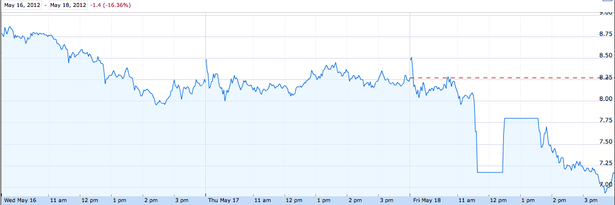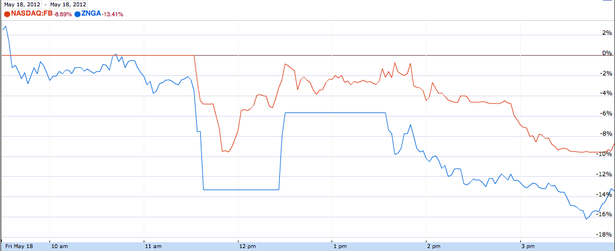Why Did Zynga's Stock Drop After Facebook Went Public?
Believe it or not, other stocks besides Facebook traded on Friday. Although Zynga probably wishes it wasn't one of them.
While Facebook's much-ballyhooed IPO didn't pop, Zynga's stock went cliff-diving. The Mafia Wars maker saw its stock crash 13 percent, before they suspended trading. It recovered to "only" down 5.5 percent or so, before they suspended trading again. Then things got bad again. It finished over 13 percent down on the day. The below chart puts this bumpy ride in context of the past few days of trading.
There are three big questions. First, what was going on with the stock's vertical action? Second, why did that vertical action stop? And finally, why is Zynga collapsing if Facebook isn't -- or is it? --- and what does that tell us?
Zynga went through its own private flash crash. The straight drop and rise and drop in its stock after Facebook's IPO is the classic signature of program trading. Whatever algorithms traders were using agreed that the stock was hugely overvalued, then undervalued, then overvalued again. So they all screamed "SELL" or "BUY" at the same time.
Then they stopped. Trading resumed at a more human pace. Why the change? One plausible explanation is that traders unloaded Zynga stock because now they could buy Facebook stock. They did so en masse -- until Zynga stock fell so far that it became too cheap to resist. Then they bought it en masse -- until Zynga stock rose so far that it became too expensive to resist dumping.
It was the great unwinding of the Zynga arbitrage. As Mathew Ingram of GigaOm pointed out, Zynga had been something of a Facebook proxy before the latter went public. It makes sense: the companies are symbiotic. Without Facebook, Zynga wouldn't exist. And without Zynga, Facebook wouldn't have about 12 percent of the revenue that it does. Once that had sorted out, Zynga's stock began trading more normally.
But if Zynga and Facebook are so connected, why did one tank while the other didn't? The answer is that they both tanked -- kind of. Now, Facebook did close barely up on the day by the metric that matters -- that is, compared to its IPO price. But that was well below its opening price of just north of $42 a share. The below chart compares Facebook (red) with Zynga (blue) for the day, from their opening prices.
Remember: Facebook's underwriters wouldn't let its share price fall below $38 a share today. That's what underwriters do. They take a company public in return for a guarantee to buy at the IPO price. So if traders thought that the IPO price was overvalued, they might have taken it out on the next best thing. Which was bad news for Zynga. That's why the news didn't get any better for the FarmVille creator even after its stock stopped flash crashing.
It's always possible to tell ourselves a story that makes sense of the day's stock moves after the fact. But it's hard to tell ourselves a story that makes today's stock moves look efficient. These kind of wild swings shouldn't happen, but do.
Just look out on Monday. The underwriters won't be there with their safety net.
Matthew O'Brien is a former senior associate editor at The Atlantic.

